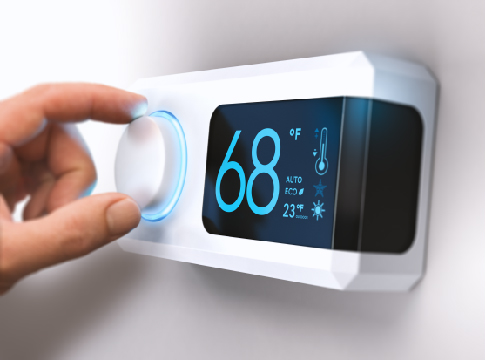Related News
Related News
-
EWEB and the UO extend energy generation study
The study is testing whether the UO’s on-site generator can bolster grid reliability and support climate and greenhouse gas reduction goals.
Find Out More -
EWEB and Lane Electric Cooperative sign agreement to transfer EWEB's McKenzie Valley customers
EWEB and Lane Electric Cooperative have reached an important milestone in transitioning electric service from EWEB to Lane Electric in the McKenzie Valley. The two utilities have officially signed agreements for EWEB to sell its electric service territory in the McKenzie Valley to Lane Electric.
Find Out More -
EWEB Board adopts 2026 organizational goals to guide utility priorities
At the January public meeting, EWEB adopted a new set of organizational goals for 2026, providing direction for our work priorities in the year ahead.
Find Out More -
Cold temperatures this week drive highest electricity demand of the winter so far
Frosty conditions in Eugene this week have driven electricity demand to the highest levels so far this winter as heaters strain to keep homes and businesses warm.
Find Out More -
Sustainability Snapshot - Celebrating Energy Efficiency Projects in the Community
Sustainability Snapshops highlight impactful projects completed by EWEB's Customer Solutions department, as a way to celebrate the meaningful work happening behind the scenes.
Find Out More -
EWEB Sets 2026 Budget and Rates, Advances Evaluation of McKenzie Valley Service Territory Realignment
Taken together, the 2026 budget and rate adjustments and the territory-realignment evaluation reflect EWEB’s dedication to responsible financial stewardship, modern, resilient utility infrastructure, and thoughtful planning for the future.
Find Out More -
Let's Talk Turkey. Is your family ready for winter?
We're heading into the holidays, but that also means snow, ice, and not-so-nice weather might be in the forecast. Here are some tips to prepare in advance.
Find Out More -
The Bonneville Power Administration Rate Change and Your EWEB Bill
BPA’s finalized rate increase is smaller than projected, and EWEB’s pass-through adjustment effective October 1, 2025 will now be 2.7% for residential customers—down from the anticipated 4%.
Find Out More -
Join the Pledge to Prepare
When you think about getting ready for an emergency, you probably have questions. You aren't alone. Preparing for emergencies can be overwhelming, which is why EWEB has put together a 12-month program to help you and your family get two weeks ready.
Find Out More -
You can’t predict the next disaster, but you can prepare
The earthquake lasted less than a minute. But now the power’s out. The tap runs dry. Cell service is spotty. Would you be ready?
Find Out More -
Sustainability Snapshot - Ideal Steel July 2025
Our second Sustainability Snapshop highlights a project where EWEB helped a local industrial warehouse upgrade over 1,000 flourescent lights to new efficient LEDs.
Find Out More -
EWEB Pilots New Line Safety Program for 4th graders.
This year, EWEB is ramping up power line safety for children, specifically 4th graders.
Find Out More -
EWEB opens applications for 2025 Electric Mobility Community Grant
The Eugene Water & Electric Board is now accepting applications for the 2025 Electric Mobility Grant, reinforcing EWEB's commitment to sustainability and cleaner transportation.
Find Out More -
Watch the Recording: Financial Preparedness for Disasters
How will you financially recover after a disaster? This seminar gives key insights into preparing your finances ahead of time.
Find Out More -
Greenpower subscribers vote to award Greenpower Grant to SquareOne Villages
The Greenpower Grant, funded solely by voluntary customer subscriptions, supports local sustainability projects.
Find Out More - Show More
The Most Efficient Way to Set Your Thermostat Depends on Your Heating System
January 18, 2020

Is it better to "set and forget," or will you save energy and money by adjusting the temperature at different times of day?
The answer depends on the type of heating system in your home.
If you have an electric forced air furnace, or resistance heat such as ceiling, wall heaters or baseboards, it is more efficient to heat only when you're home and awake.
Turn down the thermostat 7-10 degrees before you go to bed at night and when you are away from home for 8 hours or more. A programmable thermostat can do this for you automatically, and they are relatively inexpensive and easy to install.
But if you have a heat pump (ducted or ductless), maintaining a moderate setting is the most cost-effective practice.
When a heat pump is in heating mode, setting back the thermostat can cause the unit to operate inefficiently, canceling out any savings achieved by lowering the temperature setting.
Regardless of your heating system, we recommend a setting of 68 degrees for typical Eugene winter conditions.
But remember, the heating system is only one piece of an energy-efficient home. Sealing air leaks and adding insulation helps optimize your heating system's efficiency, keep your home comfortable throughout the year and reduce energy waste. Use our rebates or zero-percent interest loans to help with the cost.

